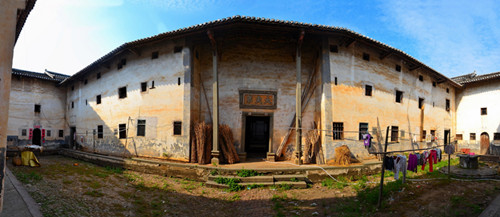Folk culture extends life of ancient Chinese villages
Author : Li Yongjie Source : Chinese Social Sciences Today 2016-07-27

The preservation of ancient villages in Guangdong Province is beneficial to architecture as well as intangible folk culture.
Ancient villages are valuable examples of cultural heritage. They contain historical and cultural information of profound importance and can be seen as “living museums” of folk culture.
Ancient villages not only offer examples of ancient architecture but also provide a window into folk literature, opera, dancing and other examples of intangible cultural heritage. Although the public has realized the importance of protecting buildings in villages, a lack of awareness regarding relic preservation makes them passive participants in the preservation of folk art and culture in these villages.
Villages that only possess material heritage items but lack sufficient knowledge of the related intangible heritage tend to become what is termed an “empty nest of culture” because there is not enough synergy between these two aspects.
In these cases, the lifestyles in the villages inevitably become more modern, but without proper understanding or awareness of the significance of traditional customs and festivals. Thus these festivals become less significant to the people.
China is a large agrarian country and most of the traditional festivals are rooted in rural areas. Some scholars have indicated that folk culture is the soul of village culture. These events help overseas Chinese, or those living far from home, deal with homesickness by importing their customs to new locations.
However, urbanization swallows traditional villages and traditional customs still tend to diminish along with these villages.
In Guangzhou, the Dragon Boat Festival, or Duanwu Festival, is the busiest season for all local villages, and one of the liveliest carnivals of folk customs as well. The Guangzhou Duanwu dragon boats are considered an example of provincial intangible cultural heritage and the dragon boat races possess a series of folk rites.
Each year on the 15th day of the first lunar month, Nanshe Village in Dongguan City celebrates the “Lantern Hanging Festival.” This festival originated in the Han Dynasty and is popular in the Pearl River Delta region in Guangdong Province. Families that have newborn baby boys will hold a ceremony that involves hanging a new lantern in the ancestral hall in order to tell ancestors that their family has no lack of successors, and to pray for the boys’ good health. This traditional custom has been passed down in Dongguan for thousands of years. The vitality of ancient villages rests in their traditional festivals and folk customs, which can bring ancient villages back to life.
In the process of protecting ancient villages, people always emphasize the significance of material carriers, such as houses, streets, ancestral halls and temples. Although material carriers are very important, the space where ancient villages exist cannot be the key cultural space if there are only static carriers. Without folk customs, those architectural sites are lifeless. Currently, the spirit of folk life in villages needs urgent protection. Those who record folkore in words or images also aid in protecting village folk customs.
The protection and utilization of village folk culture should follow two guidelines. First, the leading role of experts, scholars and professionals in efforts to protect folk customs in villages should be fully developed. Local villages should invite these experts to give advice and enhance theoretical research on village folk culture. Second, the training of folk artists and literati in rural areas should be emphasized in order to explore the rich meaning of traditional culture in ancient villages.
In recent years, some villages have developed tourism and created fake folk customs to attract tourists, which has damaged traditional customs. These fake folk customs should be banned, and the cultural value and specific meaning of cultural heritage practices should be fully respected.
Ye Shengtao made Chinese fairy tales from a wilderness
Ye Shengtao (1894–1988) created the first collection of fairy tales in the history of Chinese children’s literature...
-
How northern ethnicities integrated into Chinese nation
2023-09-18
-
Mogao caves
2023-09-12
-
Mogao Grottoes as ‘a place of pilgrimage’
2023-09-12
-
Time-honored architectural traditions in China
2023-08-29
-
Disentangling the civilizational evolution of China
2023-08-28
-
AI ethics in science fiction
2023-08-23














 2011-2013 by www.cssn.cn. All Rights Reserved
2011-2013 by www.cssn.cn. All Rights Reserved